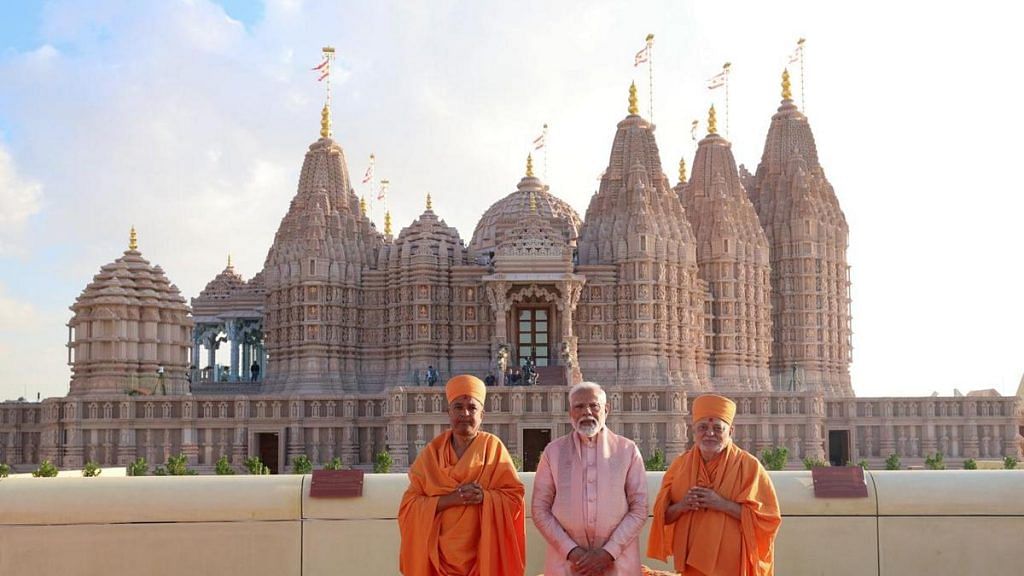New Delhi: While delivering a lecture in New Delhi, a top UAE diplomat recalled how it took President Mohamed bin Zayed Al Nahyan “five minutes” to agree to Prime Minister Narendra Modi’s request for a Hindu temple in the Gulf country during one of the Indian leader’s early visits to the UAE in the mid-2010s.
“When Prime Minister Narendra Modi came [to the UAE], one of the early requests he made was to get land for the Indian community to build this magnificent Hindu temple. We saw that as an early test of the relationship,” said Anwar Mohammed Gargash, a diplomatic advisor to the UAE president, Friday.
“It took Sheikh Mohammed bin Zayed Al Nahyan five minutes to say ‘of course, let’s find the right place’,” said Gargash, who also served as the UAE minister of state for foreign affairs from 2008-2021.
Sheikh Mohamed bin Zayed (MBZ) was, at the time, serving as the UAE’s de facto leader during the ill health of his brother Sheikh Khalifa, the country’s then president. In 2022, MBZ became the UAE President.
Earlier this month, PM Modi travelled to the Gulf country to inaugurate Abu Dhabi’s first Hindu temple. It was his seventh visit to the UAE. This came a month after he inaugurated a Ram temple in Ayodhya that was built on the land of a demolished mosque.
Though this was the third temple to be built in the UAE, it is the largest in the Middle East built by the BAPS Swaminarayan Sanstha over a 27-acre site.
It was first announced by PM Modi during his visit to the UAE in 2018, and a foundation stone-laying ceremony took place a year later.
According to Gargash, this was an example of building on a relationship that was previously like an “untended olive garden”.
The UAE and India have deepened their strategic and economic relationship in recent years, marked by the signing of a free trade agreement, a slew of reciprocal high-level visits and more.
The UAE is India’s third-largest trading partner, while India is the UAE’s second. About 3.5 million Indians live in the oil-rich country and are a source of large remittance inflows.
Also read: With Modi at the helm, India and the Arab world have become closer than ever. Here’s why
‘Houthis using Palestinian cause to launder their image’
While speaking about religious extremism in the Arab world, Gargash criticised Yemen’s Houthi rebels, who have attacked ships in the Red Sea amid the ongoing Israel-Hamas war.
“Houthis are using the Palestinian cause to launder their image…[They] launch as a militia… and then become basically a resistance movement,” he told the audience.
Iran-backed Houthis have been launching attacks in the Red Sea in solidarity with Palestinian group Hamas in Gaza.
In 2019, UAE forces withdrew from a key Yemeni port, the Hudaydah Port, in order to support a United Nations (UN)-led peace process.
“The Stockholm agreement said…the Houthis will not run the port anymore; it will be run internationally…. But these parts of the agreement didn’t materialise. The Houthis still ran Hudaydah,” said Gargash.
The UAE is part of the Saudi Arabia-led coalition against the Houthis.
(Edited by Zinnia Ray Chaudhuri)
Also read: Smriti Irani’s visit to Madinah dispels both extremes—Islamists and Hindu nationalists
